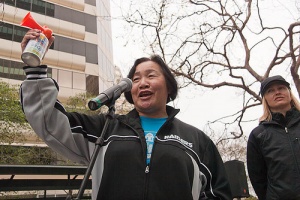Wall Street Declares War on America (Yes, this constitutes Conspiracy!)
November 16, 2011 Leave a comment
Oakland Mayor Jean Quan Admits Cities Coordinated Crackdown on Occupy Movement
Embattled Oakland Mayor Jean Quan, speaking in an interview with the BBC (excerpted on The Takeaway radio program–audio of Quan starts at the 5:30 mark), casually mentioned that she was on a conference call with leaders of 18 US cities shortly before a wave of raids broke up Occupy Wall Street encampments across the country. “I was recently on a conference call with 18 cities across the country who had the same situation. . . .”
Mayor Quan then rambles about how she “spoke with protestors in my city” who professed an interest in “separating from anarchists,” implying that her police action was helping this somehow.
Interestingly, Quan then essentially advocates that occupiers move to private spaces, and specifically cites Zuccotti Park as an example:
In New York City, it’s interesting that the Wall Street movement is actually on a private park, so they’re not, again, in the public domain, and they’re not infringing on the public’s right to use a public park.
Many witnesses to the wave of government crackdowns on numerous #occupy encampments have been wondering aloud if the rapid succession was more than a coincidence; Jean Quan’s casual remark seems to clearly imply that it was.
Might it also be more than a coincidence that this succession of police raids started after President Obama left the US for an extended tour of the Pacific Rim?

Disinformation Campaign Proves Effective as Anti-SOPA Strike-Breaker
January 19, 2012 Leave a comment
Two or three days ago, announcements were broadcast on various Media Outlets stating that two bills in the Congress and the Senate, SOPA and PROTECT-IP were effectively “Dead-in-the-Water,” resulting in the cancellation (or extreme reduction) of what would have been an extremely disruptive– and therefore highly dramatic– strike/protest by Major Internet Companies against the proposed legislation.
The fact that no sources were actually named, as well as the coordinated nature of this spurious disinformation campaign, indicates that this legislation, involving a precipitous curtailment of the Civil Liberties in the United States, indicates a scope of political interests far beyond those of the Entertainment Industry.
History shows us that a curtailment of Civil Liberties is never instituted without an eye to a further attack on those same liberties at a later date.
This debate is not over. Expect to hear opponents to these bills caricatured as disgruntled pirates of popular entertainment, 20-somethings living in their mothers’ basements, who want to continue downloading music and movies without having to pay for the privilege.
Expect to read further, and ever more disturbing, developments in the coming months.
View A Legal Analysis of S. 968, the PROTECT IP Act [PDF] from the Congressional Research Service
Filed under activism, American, American political discourse, Blog, Blogroll, business, Civil Rights, class war, Commentary, culture, culture industry, Democracy, disinformation, Economic Democracy, economy, Events, Government, Human Rights, information, information dissemination, legal, life, media, news, Opinion, Political Hypocricy, politics, propaganda, Rights, social engineering, society, technology Tagged with business, class war, conspiracy, corporate malfeasance, Corporate Personhood, Corporate Welfare, corporations, disclosure, economy, flow of information, Government Secrecy, internet, news, politics, propaganda, PROTECT IP, Rupert Murdoch, SOPA, world order, Worthless Mass Media